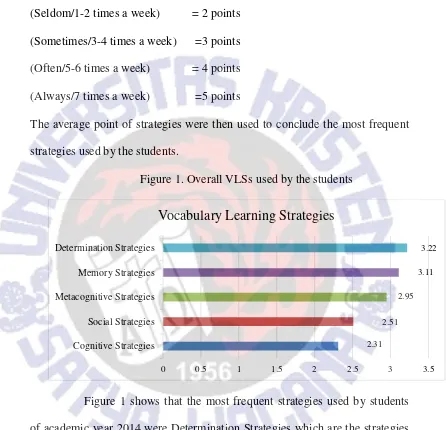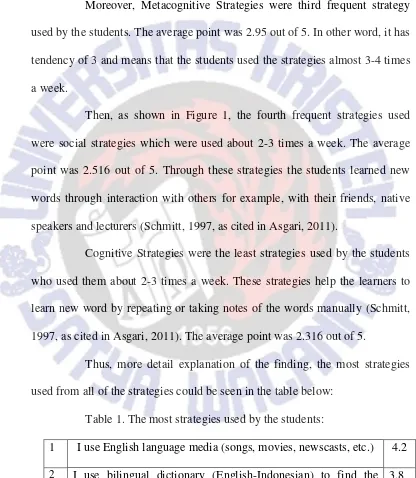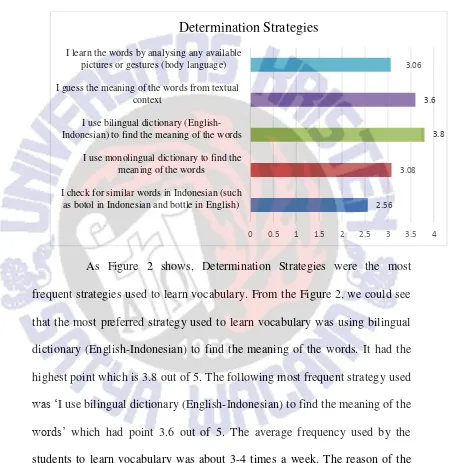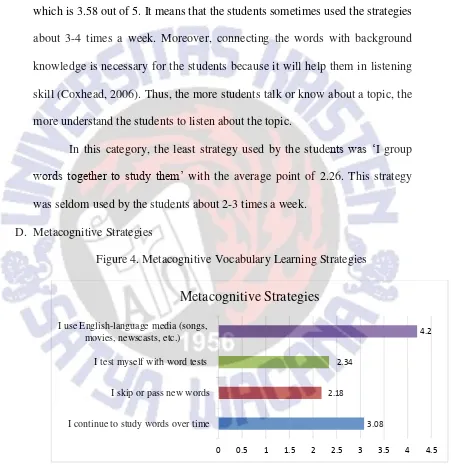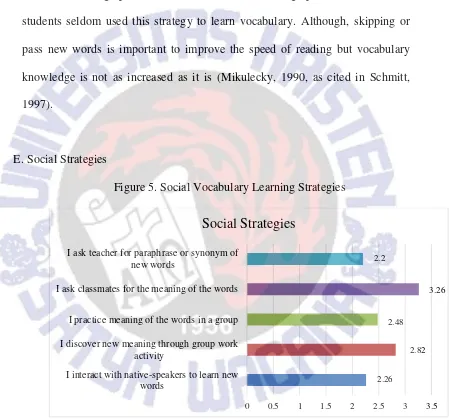STUDENTS
’
VOCABULARY LEARNING STRATEGIES IN
ENGLISH LANGUAGE EDUCATION PROGRAM
AT UNIVERSITAS KRISTEN SATYA WACANA
THESIS
Submitted in Partial Fulfillment
of the Requirements for the Degree of
Sarjana Pendidikan
Fransiska Ika Sofianti
112013106
ENGLISH LANGUAGE EDUCATION PROGRAM
FACULTY OF LANGUAGE AND ARTS
UNIVERSITAS KRISTEN SATYA WACANA
iv
COPYRIGHT STATEMENT
This thesis contains no such material as has been submitted for examination in any course or accepted for fulfillment of any degree of diploma in any university. To the best of my knowledge and my belief, this contains no material previously published or written by any other person except where due reference is made in the text.
Copyright@2017. Fransiska Ika Sofianti and Anne I. Timotius, M.Ed.
All right reserved. No part of this thesis may be reproduced by any means without the permission or at least one of the copyright owners or the English Language Education Program, Faculty of Language and Arts, Universitas Kristen Satya Wacana, Salatiga.
v
TABLE OF CONTENTS
APPROVAL PAGE………...i
COPYRIGHT STATEMENT………..ii
TABLE OF CONTENTS………iii
ABSTRACT………...1
INTRODUCTION………...2
LITERATURE REVIEW………....4
The importance of vocabulary learning……….…….……….4
Types of vocabulary learning strategies………..………5
THE STUDY………...10
Context of the Study……….……...10
Participants………....10
Instruments Data Collection Instruments………...11
Data Collection Procedures………....11
Data Analysis Procedure………12
FINDINGS AND DISCUSSION………...12
A. Overall Result………...12
B. Determination Strategies………..16
C. Memory Strategies………...17
D. Metacognitive Strategies……….18
vi
F. Cognitive Strategies ………....20
CONCLUSION………..22
REFERENCES………...24
ACKNOWLEDGEMENT………26
1
STUDENT’S VOCABULARY LEARNIN
G STRATEGIES IN
ENGLISH LANGUAGE EDUCATION PROGRAM
AT UNIVERSITAS KRISTEN SATYA WACANA
Fransiska Ika Sofianti
ABSTRACT
Vocabulary learning is important tool as a basic knowledge to learn English. However, students may have not sufficient vocabulary knowledge due to inappropriate learning strategy but some other may have. Thus, this study tried to answer the research question, „What are the strategies used by students to learn vocabulary in English language education program?‟ This study was conducted in Faculty of Language and Arts (FLA), focusing on students of English Language Education Program at Universitas Kristen Satya Wacana who were prepared as English-teachers. The participants of the study were 50 students. This study used questionnaire as an instrument to collect data based on Schmitt‟s Vocabulary Learning Strategies because the questionnaire has been able to investigate the data needed for this study. The result reveals that the most frequent strategies used was Determination Strategies, followed by Memory Strategies, Metacognitive Strategies, Social Strategies, and Cognitive Strategies.
2
INTRODUCTION
Vocabulary learning is essential to acquire second language, especially for English students who are supposed to be able to speak, write, listen and read using English. Vocabulary is the tool to communicate with others by expressing the words so that people could understand what we say (Heidari, Karimi, & Imani, 2012, p.1488). Also, a researcher argue that, vocabulary skill has advantage to improve reading understanding (Stahl, 1990, as cited in Nation, 2001, p. 144), and the use of vocabulary in oral and printed language is often different. If someone fails to use appropriate words it can cause misunderstandings (Kamil and Hiebert, 2005, p.3, as cited in Martinnen, 2008, p. 15). Vocabulary is very important in every aspect. People cannot talk and listen clearly if they do not know the language or words being used.
3
Indonesian students learn English as foreign language which is not very familiar to use in daily life communication. For example, Many learners match English words with their first language word (Laufer, 2003), but in some context the meaning of between words and sentence may be different. The students have to know the appropriate learning strategy to acquire vocabulary involve how to obtain, asses, and check their vocabulary (Griffith, 2008, p 169). By using vocabulary learning strategies, student will find it easier to acquire a large number of vocabulary (Nation, 2001, p.9). According to Seddigh and Shokrpur (2012, p.160) vocabulary knowledge is important role to make people knowing the meaning of language and the structure of the language itself. In this situation, vocabulary has important aspect to acquire second language and guide the student to the higher level of vocabulary knowledge.
4
word in mind frequently, remember the new word with the context, and asking their classmates.
This study aimed to investigate the strategies use by students of English Language Education Program at Universitas Kristen Satya Wacana to acquire language by learning vocabulary. It will be useful for students to improve their learning vocabulary in order to achieve more knowledge. The outcome of the study that has been investigated may be a guidance to choose the appropriate vocabulary learning strategies and influence the successful of language learning. Therefore, the main purpose of this study tried to answer a question the way the students to learn vocabulary, „What are the strategies used by students to learn vocabulary in the English language education program?‟
LITERATURE REVIEW
The importance of vocabulary learning strategies
5
The purpose of vocabulary learning strategies is achieve as best as the students of English language education program can do to apply English in real situation. The ability involved not only understand the material like grammar, spelling, and pronunciation but suppose involved all skill in reading, writing, speaking, and learning. As Al-Khasawneh (2012, p.1) said “The knowledge of vocabulary is essential part when using second or foreign language due to the fact one is unable to communicate with others without a sufficient Amount of words.“. In addition, according to Seddigh and Shokrpur (2012, p.160), vocabulary knowledge is important role to make people knowing the meaning of language and the structure of the language itself. Moreover, the improvement that the student get indicate that they give effort for the achievement in language learning, they may use the appropriate way to acquire language by using vocabulary learning strategy. Riankamol (2008, p.3) stated that vocabulary learning strategy is a tool which facilitate to acquire vocabulary learning. Thus, if students want to get the better understanding of language, they should have better vocabulary knowledge.
Types of vocabulary learning strategies
The strategy used by the students may be different according what strategy they feel more comfortable to use. According to He (2010, p.2) “The same
6
this study has applied the definition that is suggested by Schmitt (1997, as cited in Asgari, 2011) in two main groups of strategies involve Discovery strategies which are strategies that are used by learners to discover learning of words, and Consolidation strategies which are a word is consolidated once it has been encountered.
Then, Schmitt categorized vocabulary learning Schmitt‟s strategies into five sub-categories (Schmitt, 1997, as cited in Asgari, 2011):
Determination strategies: they are individual learning strategies. Determination strategies help the learner to determine the meaning by using dictionaries, guessing the meaning from the context and identifying the parts of speech and constituent elements (Schmitt, 1997).
Social strategies: they are learners learn new words through interaction with others. For example, asking teachers, classmates, and native speakers. Memory strategies: they are strategies, whereby learners link their learning of new words to mental processing by associating their existing or background knowledge with the new words. Memory strategies are composed of three groups: (1) Using images to create a strong connection with the word and its meaning, (2) Using strategies to link words together to help retrieval of vocabulary, (3)using knowledge aspect to stabilize the meaning.
7
Metacognitive strategies: they are strategies related to processes involved in monitoring, decision-making, and evaluation of one‟s progress. For example: using English language media, and paying attention to English words when someone is speaking English.
8
(writing), written repetition (reading), and translation. The main finding was they see important word and vocabulary as a part of language proficiency. Some of them thought that vocabulary is task that implemented in classroom context and the others thought that learning words in their daily life. Also, Amirian and Heshmatifiar (2013) found that the major of their research among EFL university students at Hakim Sabzeuari University in Iran was the determination strategies such as guessing from context and consulting a dictionary were the most popular strategies, whereas social strategies were least popular. They took 74 participants (18 males & 56 females), and they used questionnaire adapted from the taxonomy of vocabulary which is developed by Schmitt (1997).
9
from among EFL university students at Hakim Sabzeuari University in Iran commonly used guessing from context and consulting a dictionary were the most popular strategies which are determination strategies.
10
THE STUDY
Context of the study
This study was conducted in Faculty of Language and Arts (FLA), focusing on students of English language education program at Universitas Kristen Satya Wacana who were prepared as English-teachers.The faculty is located in a small town in Salatiga, Central Java, Indonesia. The study was taken in this context because the faculty is a real example of where English was taught. Moreover, in this context, the students were trained to prepare good knowledge in teaching as the basic concept and the main learning. Thus, this study wanted to investigate the way the students to use vocabulary learning strategies which help them to use and understand English.
Participants
11
Instrument of data collection
This study used questionnaire as an instrument to collect data based on Schmitt‟s Vocabulary Learning Strategies because the questionnaire has been able
to reveal the data needed for this study. The questionnaire consisted Determination Strategies, Social Strategies, Memory Strategies, Cognitive Strategies and Metacognitive Strategies.
Data collection Procedures
12
Data analysis Procedure
The questionnaire was designed to investigate the participants‟ strategies in learning English which are design to identify Determination Strategies (question 1-5), Social Strategies (question 6-11), Memory Strategies (question 12-20), Cognitive Strategies (question 21-26) and Metacognitive Strategies (question 27-30). The questionnaire was based on Schmitt (1997).
On the questionnaire, there were 5 points for each response: Never (1), Seldom (2), Sometimes (3), Often (4) and Always (5). The points used in the instrument was scales in deciding frequency of the strategies used by the participants. Thus the instrument was counted quantitatively and presented in narrative way.
FINDINGS AND DISCUSSION
A. Overall Result
The aim of the study was to investigate students‟ vocabulary learning strategies in English language education program at Universitas Kristen Satya Wacana. The strategies were divided into five categories; Determination strategies, Memory Strategies, Metacognitive Strategies, Social Strategies, and Cognitive Strategies.
13
The frequency of the use of vocabulary learning strategies: (Never: never use the strategies) = 1 point
(Seldom/1-2 times a week) = 2 points (Sometimes/3-4 times a week) =3 points (Often/5-6 times a week) = 4 points (Always/7 times a week) =5 points
The average point of strategies were then used to conclude the most frequent strategies used by the students.
Figure 1. Overall VLSs used by the students
Figure 1 shows that the most frequent strategies used by students of academic year 2014 were Determination Strategies which are the strategies to help the students to interpret the meaning of the words (Schmitt, 1997, as cited in Asgari, 2011). The average point was 3.22 out of 5. It means that the strategies were sometimes used by the students about 3-4 times a week.
14
times a week. The strategies were second frequently used in which learners connect the new words with their background knowledge (Schmitt, 1997, as cited in Asgari, 2011).
Moreover, Metacognitive Strategies were third frequent strategy used by the students. The average point was 2.95 out of 5. In other word, it has tendency of 3 andmeans that the students used the strategies almost 3-4 times a week.
Then, as shown in Figure 1, the fourth frequent strategies used were social strategies which were used about 2-3 times a week. The average point was 2.516 out of 5. Through these strategies the students learned new words through interaction with others for example, with their friends, native speakers and lecturers (Schmitt, 1997, as cited in Asgari, 2011).
Cognitive Strategies were the least strategies used by the students who used them about 2-3 times a week. These strategies help the learners to learn new word by repeating or taking notes of the words manually (Schmitt, 1997, as cited in Asgari, 2011). The average point was 2.316 out of 5.
Thus, more detail explanation of the finding, the most strategies used from all of the strategies could be seen in the table below:
Table 1. The most strategies used by the students:
1 I use English language media (songs, movies, newscasts, etc.) 4.2
2 I use bilingual dictionary (English-Indonesian) to find the meaning of the words
3.8
3 I guess the meaning of the words from textual context 3.6
15
Then, the least strategies used from all of the strategies could be seen in the table below:
Table 2. The least strategies used by the students:
1 I listen to vocabulary CDs to learn new vocabulary items 1.92
2 I skip or pass new words 2.18
3 I interact with native speakers to learn new words 2.26
4 I group words together to study them 2.26
The present study had similar result with a previous research which had been conducted by Hyoso and Tabaku (2011), which are looking up the new words in bilingual dictionary as the most favorite strategy used by the students. Also, both opening dictionary and remember new word with the context as the most frequent strategy used by the students, which are similar result with a research of Theresiawati and Timotius (2013).
16 B. Determination Strategies
Figure 2. Determination Vocabulary Learning Strategies
As Figure 2 shows, Determination Strategies were the most frequent strategies used to learn vocabulary. From the Figure 2, we could see that the most preferred strategy used to learn vocabulary was using bilingual dictionary (English-Indonesian) to find the meaning of the words. It had the highest point which is 3.8 out of 5. The following most frequent strategy used was „I use bilingual dictionary (English-Indonesian) to find the meaning of the words‟ which had point 3.6 out of 5. The average frequency used by the students to learn vocabulary was about 3-4 times a week. The reason of the result according to Nation (2001), the foreign learners get the advantage by using this strategy, they could learn the new words by themselves and add the knowledge that they have already known.
2.56
I check for similar words in Indonesian (such as botol in Indonesian and bottle in English)
I use monolingual dictionary to find the meaning of the words
I use bilingual dictionary (English-Indonesian) to find the meaning of the words I guess the meaning of the words from textual
context
I learn the words by analysing any available pictures or gestures (body language)
17
As we can see in the Figure 2, the least strategy used by the students was „I check for similar words in Indonesian‟ which had average point 2.56 out of 5. It means that the students seldom to use it and the average frequency used was about 1-2 times a week.
Similarly, Amirian and Heshmatifiar (2013) found that the major of their research among EFL university students at Hakim Sabzeuari University in Iran was the determination strategies such as guessing from context and consulting a dictionary were the most popular strategies which had similar result of this present study.
C. Memory Strategies
Figure 3. Memory Vocabulary Learning Strategies
2.9
I imagine word form (example: I make different mental image between noun and verb)
I say new word aloud when studying it I study the sound of a word I study the spelling of a word I use new words in sentences I group words together to study them I connect the words to its synonyms I connect the words to my experience
I imagine the meaning of the words
18
Memory strategies as the second frequent strategies used by the students. Memory strategies had 9 statements which described some ways to learn vocabulary. „I connect the words to my experience‟ had the highest point which is 3.58 out of 5. It means that the students sometimes used the strategies about 3-4 times a week. Moreover, connecting the words with background knowledge is necessary for the students because it will help them in listening skill (Coxhead, 2006). Thus, the more students talk or know about a topic, the more understand the students to listen about the topic.
In this category, the least strategy used by the students was „I group words together to study them‟ with the average point of 2.26. This strategy was seldom used by the students about 2-3 times a week.
D. Metacognitive Strategies
Figure 4. Metacognitive Vocabulary Learning Strategies
As shown in Figure 4, the most frequent strategy used to learn vocabulary in this category was „I use English‑language media (songs, movies, newscasts, etc.)‟ with the point 4.2 out of 5. From the result, it means that the
3.08 2.18
2.34
4.2
0 0.5 1 1.5 2 2.5 3 3.5 4 4.5
I continue to study words over time I skip or pass new words I test myself with word tests I use English-language media (songs,
movies, newscasts, etc.)
19
students often used English-language media to learn vocabulary. The average frequency used was 5-6 times a week.
While the least frequent strategy used was „I skip or pass new words‟ which had average point 2.18. Based on the the average point in the data, the
Figure 5. Social Vocabulary Learning Strategies
As the fourth frequent strategies used, social strategies had 5 statements to describe some ways to learn vocabulary. The most frequent strategy used by the students of English language education program was „I ask classmates for the meaning of the words‟ with the point of 3.26. It
I interact with native-speakers to learn new words
I discover new meaning through group work activity
I practice meaning of the words in a group I ask classmates for the meaning of the words I ask teacher for paraphrase or synonym of
new words
20
means the students sometimes used this strategy. They used this strategy about 3-4 times a week.
While the least frequent strategies used was „I ask teacher for paraphrase or synonym of new words‟ with the point of 2.2. Meanwhile, they seldom used this strategy (1-2 times a week).
Similarly, in this social vocabulary learning strategies, both this present study and previous study which was done by Theresiawati and Timotius (2013) had similar result. These both studies found that „I ask classmates for the meaning of the words‟ as the most favorite strategies
used and „I ask teacher for paraphrase or synonym of new words‟ as the
least strategies used by the students. Also, a study was done by Al-Khasawaneh (2012) found that asking classmates for the meaning of the words had the high frequency to use this strategy.
F. Cognitive Strategies
Figure 6. Cognitive Vocabulary Learning Strategies
2.3 I listen to vocabulary CDs to learn new
vocabulary items
I take notes of new words in class I use flash cards to learn new words
I make word lists I write the new words repeatedly
21
As the least category of strategies used in learning vocabulary, Cognitive Strategies consisted of 6 statements. According to Schmitt (1997, as cited in Asgari, 2011), these strategies do not engage learners in mental processing but is more mechanical.
The most frequently strategy used in this category was „I take notes of new words in class‟ with the average point of 3.16. It means that the students sometimes used this strategy, and the average frequency was 3-4 times a week.
While the least strategy used was „I use flash cards to learn new words‟ with the average point of 1.64. Thus, the average point shows that the students seldom used the strategy because they used the strategy about 1-2 times a week.
22
CONCLUSION
The aim of this present study was to investigate students‟ vocabulary learning strategies in English Language Education Program at Universitas Kristen Satya Wacana. Therefore, this research try to answer a question, „what are the strategies used by the students to learn vocabulary in English language education program‟?
The result reveals that the most frequently strategies used was Determination Strategies which had average point 3.22 out of 5, followed by Memory Strategies with the average point of 3.115, Metacognitive Strategies with the average point of 2.95, Social Strategies (2.5166 points), Cognitive Strategies (2.316 points).
First, the most frequent strategy used in Determination Strategies was „I use bilingual dictionary (English-Indonesian) to find the meaning of the words‟ (3.8 points), while the least frequently strategy used was „I check for
similar words in Indonesian‟ (2.56 points). Second, in the Memory Strategies, the most frequently strategy used was „I connect the words to my experience‟ (3.58), while the least frequently strategy used was „I group words together to study them‟ (2.26 points). Third, the most frequently strategy used in Metacognitive Strategies was „I use English‑language media (songs, movies, newscasts, etc.)‟
23
(2.08 points). Fifth, the last used strategy was Cognitive Strategies. The most frequently strategy used was „I take notes of new words in class‟ (3.16 points), while the least frequently strategy used was „I use flash cards to learn new words‟ (1.64 points).
There are some limitations in this research. First, this research was conducted in English language education program only. It did not bring the research in wider context. Thus the general finding was about students‟
vocabulary learning strategies in English teaching education program. In addition, the participants were from academic year 2014 as best sample to conduct this research, further research may use participants from every academic year to investigate vocabulary strategies used in this program. Also, this research only used questionnaire instrument to get the data. For the further investigation, interviewing the participants could be used, whether it is used as an addition instrument to complete the data from the questionnaire or as the only instrument.
24
REFERENCES
Amiran, S. M. R., & Heshmatifiar, Z. (2013). A survey on vocabulary learning strategy: A case of Iranian EFL university students. Journal of Language
Teaching and Research, 4(3), 636-641.
Al-Khasawneh, F. M. (2012). Vocabulary learning strategies: A case of Jordan University of science and technology. English for Specific Purpose World, 12, 1-15
Asgari, A. (2011). The type of vocabulary learning strategies used by ESL students in University Putra Malaysia. English Language Teaching, 4(2), 84-90.
Chuk, J. Y. (2003). Promoting learner autonomy in the EFL classroom: The exploratory practice way. Preceding of the Independent Learning
Conference, 1-17.
Coxhead, A. (2006). Essentials of teaching academic vocabulary. United States of America: Thomson Heinle.
Ghazal, L. (2007). Learning vocabulary in EFL context through vocabulary learning strategies. Novitas-ROYAL: Research on Youth and Loyal, 1(2), 84-91.
Griffiths, C. (Eds). (2008). Lesson from good language learners. United Kingdom: Cambridge University press.
Gu, Y. P. (2003). Fine Brush and Freehand: The vocabulary-learning of two successful Chinese EFL learners. TESOL Quarterly, 37(1), 73-104.
He, Yu. (2010). A study of L2 vocabulary learning strategies; Kristianstad
University, The School of Teacher Education.
Heidari, L. G., Kalimi, F., & Imani, A. (2012). Vocabulary learning strategy instruction: It‟s impact on English for specific purpose vocabulary achievement and reading comprehension. Middle-East Journal of Scientific
25
Hyoso, K., & Tabaku, E. (2011). Important of vocabulary teaching to advanced foreign language students in improving reading comprehension. Problem of
Education in 21th Century, 29, 53-62.
Laufer, B. (2003). Vocabulary acquisition in a second language: do learners really acquire most vocabulary by reading? Some empirical evidence, 567-588.
Marttinen, M. (2008). Vocabulary learning strategies used by upper secondary
students studying English as second language. Unpublished master‟s thesis,
University of JYVÄSKYLÄ, Western Finland.
Nation, I. S. P. (2001). Learning vocabulary in another language. Cambridge: Cambridge University Press.
Seddigh, F., & Shokrpur, N. (2013). Vocabulary learning strategies of medical students at Shiraz University of medical science. English Language
Teaching, 5(2), 160-173.
Schmitt, N. (1997). Vocabulary learning strategies. Cambridge: Cambridge University Press.
Riankamol, N. (2008). A Survey Study of Vocabulary Learning Strateies of Gifted English Students at Triam Udomsuka School in the First Semester of Academic Year 2008; Thammasat University, Teaching English as Foreign Language Institute.
26
ACKNOWLEDGEMENTS
27
3 I use bilingual dictionary (English-Indonesian) to find the meaning of the words
4 I use monolingual dictionary to find the meaning of the words
5 I check for similar words in Indonesian (such as botol in Indonesian and bottle in
English)
6 I ask teacher for a translation in Indonesian
7 I ask teacher for paraphrase or synonym of new words
8 I ask classmates for the meaning of the words
9 I practice meaning of the words in a
group Dear Students,
I am doing a research about Student’s Vocabulary Learning Strategies in English
Language Education Program at Universitas Kristen Satya Wacana. Therefore, I hope
you don’t mind to fill the questionnaire. Choose what really you do in learning
vocabulary not you think as useful to be used in learning English by putting the tick ()
28
Never Seldom Sometimes Often Always
10 I discover new meaning through group work activity
11 I interact with native-speakers to learn
new words
12 I imagine the meaning of the words
13 I connect the words to my experience
14 I connect the words to its synonyms
20 I imagine word form (example: I make different mental image between noun and verb)
21 I write the new words repeatedly
22 I make word lists
23 I use flash cards to learn new words
24 I take notes of new words in class
25 I listen to vocabulary CDs to learn new
vocabulary items
26 I keep a vocabulary notebook
27 I use English-language media (songs, movies, newscasts, etc.)
28 I test myself with word tests
29 I skip or pass new words
30 I continue to study words over time
If you use any other strategies to learn vocabulary which are not put in the questionnaire, please write them in the space provided and mention its scale (never, seldom, sometimes, often, and always)
……… ………
